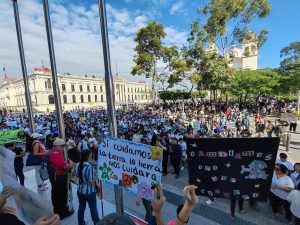
We knew the importance of international solidarity
and its need,
But we knew that the guarantee of our struggle
It was in our own strength
Roque Dalton, “The dead of Vietnam speak”
By Samuel Cortés Hamdan
Nayib Bukele's controversial administration in El Salvador has reopened another front of social dispute, this time over the reactivation of metal mining.
In December 2024, the Legislative Assembly — which has also had its tense relations with the president, even once emboldened to enter the premises accompanied by the military — advanced the metal mining law, which reverses a 2017 ban.
The day before, Bukele called the refusal to exploit Salvadoran gold absurd and asserted that “studies carried out in only 41% of the potential area” found 50 million ounces of gold in Salvadoran soil, which could translate into more than 131 billion dollars, 3.8% of the country's Gross Domestic Product (GDP).
With 57 of 60 possible votes, the government approved the exploitation of Salvadoran gold by the end of 2024, with the argument that economic development will be achieved and jobs will be created.
El Salvador, defending its parliamentary power in the corresponding information note, “is located in the Pacific Ring of Fire, one of the richest areas in mineral resources thanks to its volcanic activity: there are deposits of lithium, cobalt, nickel, which are used to make renewable energy storage batteries.”
Environmental, human rights and violence threats
On the same day that the Salvadoran metal mining law was approved, December 23, 2024, the Institute for Policy Studies (IPS) of the United States published an article warning of environmental threats to the Central American country.
Contrary to official promises of sustainable development, the organization asserted that the advance of this extractive model aggravates the environmental risks that currently challenge El Salvador, and will probably lead to human rights violations, pollution and threats to public health.
“And they will have an adverse economic impact on important industries, such as agriculture and tourism. El Salvador cannot undermine its path to water conservation, healthy communities and sustainable neighborhoods. This is a contradiction in terms,” said the authors of the analysis, Robin Broad, John Cavanagh, Jan Morrill and Manuel Pérez-Rocha.
In developing their arguments, the evaluators considered that, according to an opinion poll conducted by the José Simeón Cañas Central American University, 59% of Salvadorans consider that the country is not suitable for industrial mining.
They also point out that Salvadoran gold is extremely fine, it does not come in solid nuggets, so huge amounts of water are required for its filtering, with a consumption of up to 18 thousand liters for each ounce of metal extracted.
“El Salvador has the lowest water resources per capita in Central America and is among the lowest in the entire hemisphere. Gold mining threatens both the quantity and quality of the water supply,” they stress.
They also pointed to risks surrounding violence and security, which has been one of the most visible banners of Bukele's administration. His fight against gangs, a social scourge in El Salvador since the years of the civil war, has earned him high levels of public popularity and the executive often resorts to the argument of pacification to advance his political agenda.
On the other hand, however, IPS analysts warned that mining interests tend to increase cases of corruption, through the purchase of local authorities in exchange for financial favors.
They also recalled that in 2009, three water defenders were murdered, while in 2023, mining was the area most linked to the murder of environmental activists worldwide.
“Honduras, Guatemala and Nicaragua are usually among the ten countries with the most violations against environmental defenders,” they noted.
Citizen mobilization
This Sunday, January 19, 2025, different civil organizations, students and the deputy Claudia Ortiz, affiliated with the Vamos party, demonstrated in the historic center of El Salvador to demand that President Bukele and the Legislative Assembly repeal the metal mining law.
Gathered under the slogan “Yes to life, no to mining,” the protesters sought to collect signatures against the extractive measure.
“El Salvador is not a country suitable for mining, it puts ecosystems and health at serious risk. Anyone who ignores this is going against the will of the majority of the population. Here we choose life, that is why we say no to mining,” said the Salvadoran Ecological Unit (UNES).
Meanwhile, the Central American Alliance Against Mining (Acafremin) argued that mining pollution of rivers could be irreversible, affecting both diversity and the human right to access water.
"The pollution left in the basins also affects the population with chronic diseases, such as kidney failure and cancer," he said.
“Water is worth more than gold,” “Rivers don’t scream, but I do,” “Bukele, let your gold be bitcoin, our gold is the forests and rivers,” “El Salvador’s gold is green” were some of the slogans expressed by the protesters on banners.
“Something is awakening in Salvadorans, believers are collecting signatures, young people are mobilizing, more people are raising their voices with courage. The people do not want to return to the past, that is why there is hope for the future. Let's move forward!” wrote parliamentarian Ortiz on her X account.
You may be interested in: Trump's war on immigrants a threat to public health

